
Thursday and Friday, May 8th and 9th, marks the 80th anniversary of the so-called VE Day and the end of the Second World War in Europe. Officially. One could argue it is still going on.
The May issue of The White Worker, the official publication of the American Nazi Party, soon to be published, includes an article by Dr. William Pierce called “General Patton’s Warning”, which I would like to share in part here.
For obvious reasons, the subject of VE day long bothered me. Even before I became a National Socialist, I was aware that something about the standard narrative of how the Allies stopped the Evil Germans® (registered trademark, Hollywood Propaganda Department, all rights reserved) didn’t pass the sniff test. If Britain was fighting to liberate Poland, why did it become a Soviet satellite territory after the war? If America was supposedly neutral, why was it offering to “lend” Britain the war materials it needed to fight, and actively broadcasting U-boat positions as early as October 1939, and actively attacking them in April of 1941? If the Allies truly wanted to help the peoples of Europe, why did it ignore or reject every peace-proposal offered throughout the course of the war? If the Allies were so righteous, why did they bomb civilians throughout Europe indiscriminately, destroying not only innocent lives, but the cultural heritage of White civilization.
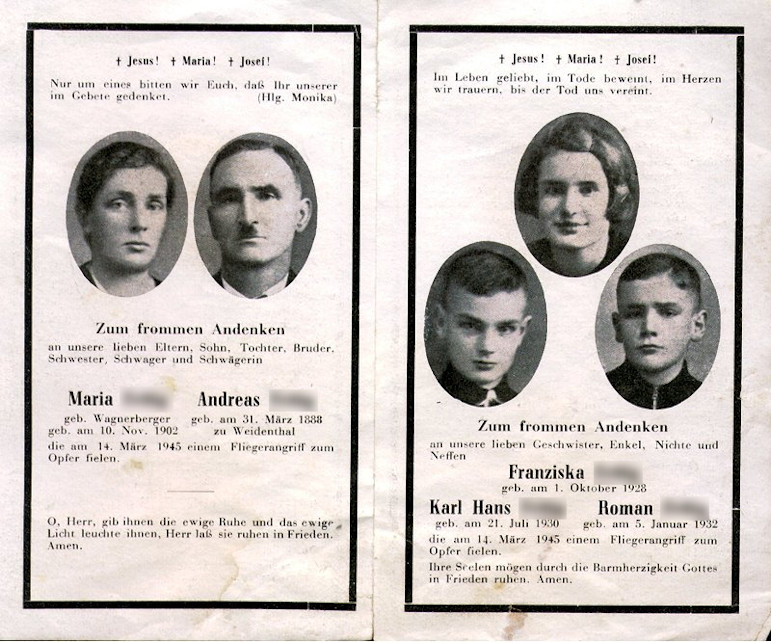
on 14 March 1945. From a news report:
“…an American is said to have testified that the property was attacked because, according to observations by their intelligence officers, military personnel were constantly coming and going. In fact, the family always had an open house and a helping hand for the Italian prisoners of war housed in the neighborhood and their German guards.“
Two of their sons were in the woods at the time, and survived. However, their neighbor and her two small children were also killed in the attack.
Why did the Allies accuse German soldiers of war crimes when they themselves were guilty of the same actions? The Allies condemned the Germans for using forced labor, then used German POWs as forced labor for years after the war. In another example, Joachim Peiper of the 1st SS was accused of commanding a battle group that shot prisoners in the so-called Malmedy Massacre (leaving aside for now the fact they were behind enemy lines, short on supplies, and couldn’t very well take the prisoners with them), while the standing orders for the US 740th Tank Battalion were to do exactly the same thing, in the same battle:
…the word was passed down to us from Army Headquarters: don’t take any SS prisoners and boy we didn’t. From then on we found out about the massacre and we said the hell with them we’re going to kill them all off…”
Harry Miller, 740th Tank Battalion

Still, for all of that and for many years, I was able to look at the war with a sort of equanimity. After all, I had family on both sides. In my gut, I knew the wrong side had won; subsequent history has made that more than clear. But I could respect and appreciate both sides. When I built scale models, I might build a P-51D Mustang one week, and a Königstiger the next. I could watch Saving Private Ryan (which I now recognize as a Jewish masturbatory fantasy) with a degree of neutrality (and noted the scene in the beginning where the Allied troops shot the two Germans who had surrendered and have their hands up—nice to see a hint of truth in a mainstream production that maybe the “Greatest Generation” didn’t all wear shining armor and ride white horses).
I started to suspect something was amiss when I spent more time reading and comparing the worldview of National Socialism with the ridiculous domestic policies of our country and the lack of accountability for anyone in political office higher than a city-council member, while simultaneously noting with increasing disgust the underlying Jewish influence in our media and politics. Of course, I should have recognized that my subconscious was trying to tell me something when, while watching Schindler’s List, I found myself rooting for the SS.
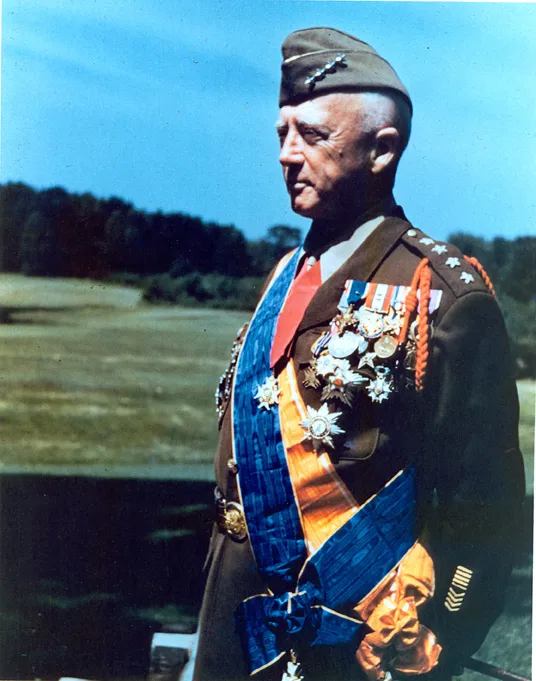
Still, I was a good All-American White Boy, raised to believe that America was right, everyone else was wrong, and my grandfather’s generation really was the greatest. I grew up admiring the heroes of the 20th century: Alvin York, Charles Whittlesey of Lost Battalion fame, Billy Mitchell, Eddie Rickenbacker (brief aside: my Great-Grandmother love to tell the story of how Eddie Rickenbacker knew the family and drove the family car- once. She said he drove like a madman), Charles Lindbergh, Chuck Yeager, Audie Murphy, etc. But above them all was one man: George S. Patton, Jr.
Of course, I had German heroes too: Adolf Galland, Karl Doenitz, Erwin Rommel, Otto Krestchmer, and any German soldier that fought in Stalingrad. But, I remember the night my father brought home the VHS, or it might have been Betamax, of the 1970 movie Patton, starring George C. Scott. He had borrowed the brand new $1,000 video-tape player from his office where it was used for sales training. He pulled me from my room, sat me on the couch, and said, “Watch this.”
And I was hooked. Here was a fallible, human, rough-around-the-edges man who nonetheless stood as a paragon of honor and duty. A man’s man. So influential was this that when I joined the Army, it was with the intention of being a tank driver in West Germany. I ended up being an Infantryman, but that’s a story for another day.
Compared to war, all other forms of human endeavor shrink to insignificance. God help me, I do love it so.”
― George S. Patton Jr.

But as time went on and I learned more and more about the true cost of the war to our people, and the lies that were told to wage it, the allure of these Allied heroes from WWII began to fade. Even that of my beloved Patton. In time it became apparent that the sacrifices and tenacity demonstrated by the Allies was a wasted effort: Europe and the world were worse-off for their actions. They had done more harm than good. The wrong side had won the war.
There was a hint of this in the 1970 movie, when Patton suggests that they turn their army around, enlist the help of the remaining Germans, and strike at the Soviets. But this was lightly brushed over in the movie, more a sop to the Cold War taking place at the time than a representation of Patton’s true feelings. This is unfortunate, as upon further examination, Patton really did come to recognize that he and his men had been sold a bill-of-goods, and that they had fought the wrong enemy.
I still see the Allied political leaders as criminals, but increasingly I am able to shake my head in sadness and disappointment when I consider the troops, for they were deluded and their efforts bolstered with lies. Most, including Patton, did not know any better until it was too late. At least his eyes were opened before he died, and this goes some way toward exonerating him in my eyes. The truth comes to us all, in its own time.
What follows is an abridged version of Dr. William Pierce’s article “General Patton’s Warning”:

General Patton’s Warning
Dr. William L. Pierce
originally published in Attack! Vol. 53, 1977
THIRTY-TWO YEARS AGO, in the terrible summer of 1945, the U.S. Army had just completed the destruction of Europe and had set up a government of military occupation amid the ruins to rule the starving Germans and deal out victors’ justice to the vanquished. General George S. Patton, commander of the U.S. Third Army, became military governor of the greater portion of the American occupation zone of Germany.
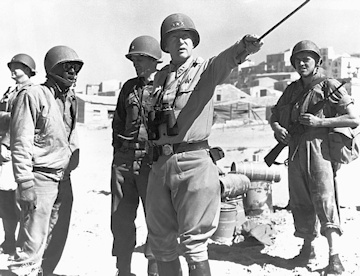
Patton was regarded as the “fightingest” general in all the Allied forces. He was considerably more audacious and aggressive than most commanders, and his martial ferocity may very well have been the deciding factor which led to the Allied victory. He personally commanded his forces in many of the toughest and most decisive battles of the war: in Tunisia, in Sicily, in the cracking of the Siegfried Line, in holding back the German advance during the Battle of the Bulge, in the exceptionally bloody fighting around Bastogne in December 1944 and January 1945.
During the war Patton had respected the courage and the fighting qualities of the Germans — especially when he compared them with those of some of America’s allies — but he had also swallowed whole the hate-inspired wartime propaganda generated by America’s alien media masters. He believed Germany was a menace to America’s freedom and that Germany’s National Socialist government was an especially evil institution. Acting on these beliefs he talked incessantly of his desire to kill as many Germans as possible, and he exhorted his troops to have the same goal. These bloodthirsty exhortations led to the nickname “Blood and Guts” Patton.
It was only in the final days of the war and during his tenure as military governor of Germany — after he had gotten to know both the Germans and America’s “gallant Soviet allies” — that Patton’s understanding of the true situation grew and his opinions changed. Several months before the end of the war, General Patton had recognized the fearful danger to the West posed by the Soviet Union, and he had disagreed bitterly with the orders which he had been given to hold back his army and wait for the Red Army to occupy vast stretches of German, Czech, Rumanian, Hungarian, and Yugoslav territory which the Americans could have easily taken instead. The more he saw of the Soviets, the stronger Patton’s conviction grew that the proper course of action would be to stifle communism then and there, while the chance existed.
We have failed in the liberation of Europe; we have lost the war!”
~General Patton
Having immediately recognized the Soviet danger and urged a course of action which would have freed all of eastern Europe from the communist yoke with the expenditure of far less American blood than was spilled in Korea and Vietnam and would have obviated both those later wars — not to mention World War III — Patton next came to appreciate the true nature of the people for whom World War II was fought: the Jews.

Most of the Jews swarming over Germany immediately after the war came from Poland and Russia, and Patton found their personal habits shockingly uncivilized. He described in his diary one DP camp, “where, although room existed, the Jews were crowded together to an appalling extent, and in practically every room there was a pile of garbage in one corner which was also used as a latrine. The Jews were only forced to desist from their nastiness and clean up the mess by the threat of the butt ends of rifles. Of course, I know the expression ‘lost tribes of Israel’ applied to the tribes which disappeared — not to the tribe of Judah from which the current sons of bitches are descended. However, it is my personal opinion that this too is a lost tribe — lost to all decency.”
A September diary entry, following a demand from Washington that more German housing be turned over to Jews, summed up his feelings: “Evidently the virus started by Morgenthau and Baruch of a Semitic revenge against all Germans is still working. Harrison [a U.S. State Department official] and his associates indicate that they feel German civilians should be removed from houses for the purpose of housing Displaced Persons. There are two errors in this assumption. First, when we remove an individual German we punish an individual German, while the punishment is not intended for the individual but for the race. Furthermore, it is against my Anglo-Saxon conscience to remove a person from a house, which is a punishment, without due process of law. In the second place, Harrison and his ilk believe that the Displaced Person is a human being, which he is not, and this applies particularly to the Jews, who are lower than animals.”
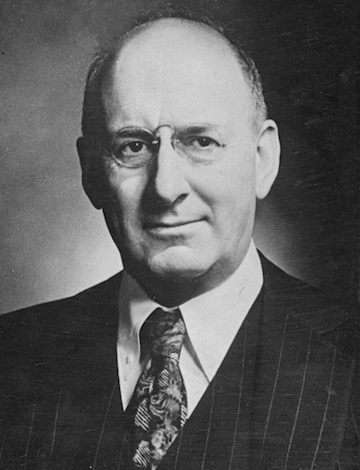
Henry Morgenthau, Jr
Henry Morgenthau, the Jewish Secretary of the Treasury (1934–1945) and a top adviser to President Roosevelt, formulated the notorious “Morgenthau Plan” for the postwar destruction of Germany. Inspired by a Talmudic hatred for the Germans, who had dared to lift their hands against “God’s Chosen People,” Morgenthau’s scheme called for the total destruction of Germany’s industry and natural resources and for starving 30,000,000 Germans to death. Thus, Morgenthau hoped for a Jewish revenge against the Germans and the simultaneous delivery of Europe to his Marxist brethren in Moscow. Fortunately, Patton’s 1945 warnings finally took hold, and in 1947 the Morgenthau Plan was scrapped.
Still, various news agencies, political figures, and even colleagues such as Brig. Gen. Philip S. Gage urged Patton to treat the Germans, soldiers and civilians alike, with harshness and even cruelty. But Patton continued to do what he thought was right, whenever he could. With great reluctance, and only after repeated promptings from Eisenhower, he had thrown German families out of their homes to make room for more than a million Jewish DP’s — part of the famous “six million” who had supposedly been gassed — but he balked when ordered to begin blowing up German factories, in accord with the infamous Morgenthau Plan to destroy Germany’s economic basis forever.
Similarly, he expressed his doubts to his military colleagues about the overwhelming emphasis being placed on the persecution of every German who had formerly been a member of the National Socialist party. In a letter to his wife of September 14, 1945, he said: “I am frankly opposed to this war criminal stuff. It is not cricket and is Semitic. I am also opposed to sending POW’s to work as slaves in foreign lands, where many will be starved to death.”

In his diary he noted: “Today we received orders … in which we were told to give the Jews special accommodations. If for Jews, why not Catholics, Mormons, etc? … We are also turning over to the French several hundred thousand prisoners of war to be used as slave labor in France. It is amusing to recall that we fought the Revolution in defense of the rights of man and the Civil War to abolish slavery and have now gone back on both principles.”
His duties as military governor took Patton to all parts of Germany and intimately acquainted him with the German people and their condition. He could not help but compare them with the French, the Italians, the Belgians, and even the British. This comparison gradually forced him to the conclusion that World War II had been fought against the wrong people.
This conviction, that the politicians had used him and the U.S. Army for a criminal purpose, grew in the following weeks. During a dinner with French General Alphonse Juin in August, Patton was surprised to find the Frenchman in agreement with him. His diary entry for August 18 quotes Gen. Juin: “It is indeed unfortunate,mon General, that the English and the Americans have destroyed in Europe the only sound country — and I do not mean France. Therefore, the road is now open for the advent of Russian communism.”
Later diary entries and letters to his wife reiterate this same conclusion. On August 31 he wrote: “Actually, the Germans are the only decent people left in Europe. It’s a choice between them and the Russians. I prefer the Germans.” And on September 2: “What we are doing is to destroy the only semi-modern state in Europe, so that Russia can swallow the whole.”

[Patton continued to voice his opinion publicly. The press had a field day, and demanded his removal]. Eisenhower responded immediately to the press outcry against Patton and made the decision to relieve him of his duties as military governor and “kick him upstairs” as the commander of the Fifteenth Army. In a letter to his wife on September 29 Patton indicated that he was, in a way, not unhappy with his new assignment, because “I would like it much better than being a sort of executioner to the best race in Europe.”
Patton continued to express these sentiments to his friends — and those he thought were his friends. He saw the demoralization of the Army as a deliberate goal of America’s enemies: “I have been just as furious as you at the compilation of lies which the communist and Semitic elements of our government have leveled against me and practically every other commander. In my opinion it is a deliberate attempt to alienate the soldier vote from the commanders, because the communists know that soldiers are not communistic, and they fear what eleven million votes [of veterans] would do.” His denunciation of the politicization of the Army was scathing: “All the general officers in the higher brackets receive each morning from the War Department a set of American [newspaper] headlines, and, with the sole exception of myself, they guide themselves during the ensuing day by what they have read in the papers….”
In [another letter], Patton also revealed his own plans to fight those who were destroying the morale and integrity of the Army and endangering America’s future by not opposing the growing Soviet might: “It is my present thought … that when I finish this job, which will be around the first of the year, I shall resign, not retire, because if I retire I will still have a gag in my mouth. … I should not start a limited counter-attack, which would be contrary to my military theories, but should wait until I can start an all-out offensive….”
Two months later, on December 23, 1945, General George S. Patton was silenced forever.

American Cemetery and Memorial, Luxembourg

Thus ends Dr. Pierce’s article, of which this is but an abridgment. Of course, I recommend the article in full. I also suggest that this VE day, while the Jews and their political lap-poodles celebrate their victory, we remember that they are celebrating a lie, and that those Allies who fought for it were only doing so after being deliberately misled. We can take comfort in knowing: it is increasingly accepted that the war did not need to happen; the Allies were used to further the agenda of a small cadre of globalists; the wrong side won; and the only people who really emerged victorious were Jews and communists.
Amerika Erwache!
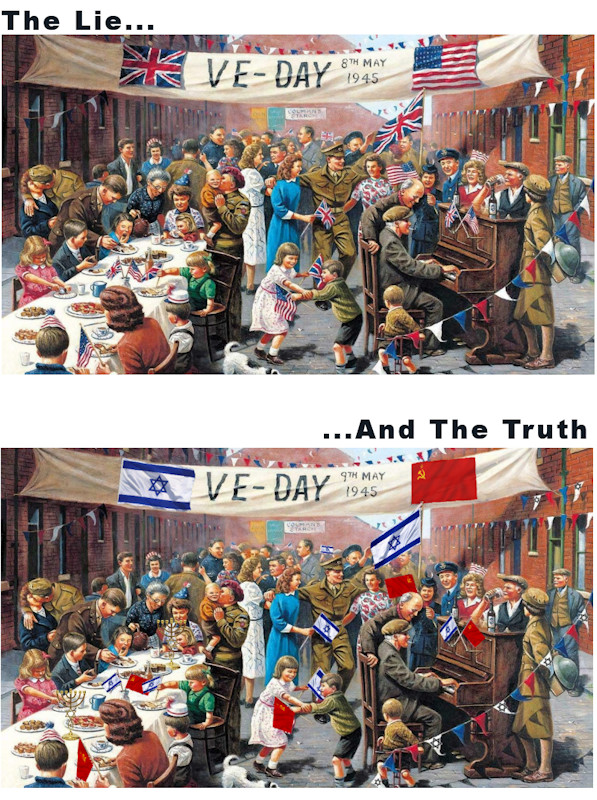
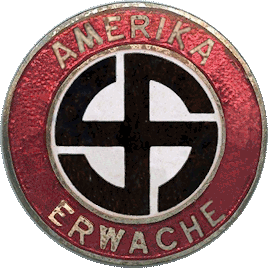
Leave a Reply